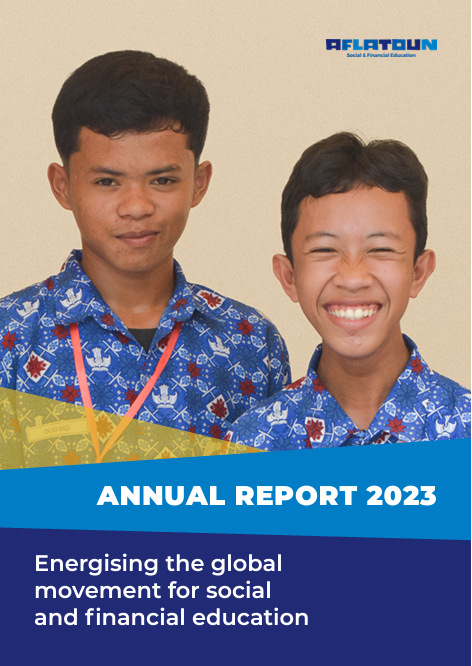Togo’s children, youth and all learners face unprecedented challenges in terms of learning, employment and social cohesion. This is why Aflatoun, with its local partners in Togo FESEN , has started the project “Life Skills and Financial Education Through a Gender Lens”, supported by Dubai Cares. The objective is to implement Social and Financial skills into school training.
In 2019, Togo officially launched the Aflateen+ programme as part of the ‘Life Skills and Financial Education Through a Gender Lens’ project, which aims to reach 6000 young people in three countries – Togo, Mali and Niger, of which at least 50% girls. The launch of the programme in Togo marked a turning point for young learners. The country had just extended an experimental concept from pre-school and primary schools to secondary school students. And the conclusive results of the test phase pushed Aflatoun International to set new ambitions: to strengthen the capacities of two thousand (2000) young people in the 14 to 18 age group in social and financial education through the Aflateen+ programme over 3 years.
The idea of integrating the Aflatoun concepts responded to the urgent needs of the time and the Sustainable Development Goals. Mrs. Djani Kossiwa, education inspector and then focal point of the project within the ministry explains: “Aflatoun responded to a need within the Togolese education system, that of financial education, and provided this complement to enable learners to identify activities to be carried out in the case of their school or life project. The school will therefore help children to understand their environment and to act on their living environment through concrete actions.” For her, this social and financial education addresses the key issues of the learners’ development in different sectors such as girls’ empowerment, environmental protection, health, etc.

Learners are won over
In Togo, a number of secondary schools have benefited from the programme.
The curriculum has greatly appealed to the students, some of whom have discovered unsuspected skills: “I can only say thank you to the Aflatoun Club because today I have discovered that I am gifted in business. I think I have found my true vocation,” confided Yvette Bodjona, a student in her final year at the Lycée Ste Fatima in Tsévié. Merveille, a student in the sewing workshop at the Lycée d’Enseignement Technique in Lomé, decided to enroll, attracted by learning about savings and financial management: “The idea that attracted me was that of financial independence. Coming from an average family, learning to manage my pocket money better and thus relieving my parents was a comforting idea for me.”
The introduction of Aflatoun concepts in school curricula is also in line with the ambitions of the Central Bank of West African States (BCEAO). The institution, which has developed a regional financial inclusion strategy and financial literacy programme for the West Africa Economic and Monetary Union (WAEMU) population, has taken an interest in the Aflatoun programme. For Professor Kounetsron Y. Messah, representing higher education in the national commission for the follow-up and the implementation of the regional strategy for financial inclusion (CNSMO), Aflatoun’s experience within the education system is not negligible. This is why the commission decided to build on the educational component of the Aflatoun concepts.
Despite the success of the Aflateen+ programme in Togo’s schools, challenges remain. For Ms. Samah Tinka, the coordinator of the project in Togo, the first ambition is to include the Aflatoun concepts in school textbooks and to increase financial education among the target group through podcasts in national languages. This will enable the target group to be extended to young people who have dropped out of school.
Author: Marthe Nounfoh Fare











